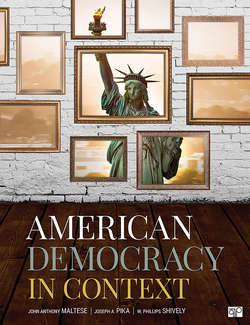Читать книгу American Democracy in Context - Joseph A. Pika - Страница 67
На сайте Литреса книга снята с продажи.
Weaknesses of the Articles of Confederation
ОглавлениеWhen drafting the Articles of Confederation, the delegates to the second Continental Congress focused more on the potential threats posed by a national government than on the benefits such a government might provide. After all, their bitter experience with Great Britain was fresh on their minds. Therefore, they were more concerned with limiting government than empowering it.24 Moreover, people still thought of themselves as citizens of their particular state: They were Virginians or New Yorkers rather than Americans. Worse, states fundamentally mistrusted each other. They also had widely divergent economic interests and often saw each other as competitors. These factors led to the creation of a governing document with fundamental weaknesses.
The most obvious weakness of the Articles was that the national government had too little power. For example, Congress had no power to tax. This severely limited the ability of the national government to raise money to pay for debts incurred during the Revolutionary War. Congress requested money from the states, but payment was voluntary and compliance was poor.25 To modern eyes, not giving Congress the power to tax seems strange, but if you remember that the American Revolution was a revolt against taxation by a distant government, then withholding of this power from the unfamiliar and distant national government (as opposed to familiar and near state governments) becomes more understandable.26
Congress also lacked the power to regulate commerce among the states. As a result, states jostled for economic advantage, routinely using protective tariffs (taxes imposed on imported goods) against one another as well as against foreign nations. Trade was further hindered by the fact that the new nation had no common currency. Although the new national government could, and did, print money to pay war debts, each state also produced its own currency. Since some states printed more money than others, currency from different states had different values, complicating trade and hurting the economy.
Description
Rhode Island’s $3 bill came to be worth no more than the paper it was printed on.
Sarin Images / GRANGER — All rights reserved.
Significantly, Congress did not even have a permanent home. It originally sat in Philadelphia, but the delegates fled to Princeton, New Jersey, in June 1783 when a mutinous group of hundreds of Revolutionary War veterans mobbed Independence Hall, where the Confederation Congress was then meeting, to demand pay for their war service. After a little more than four months in Princeton, the Confederation Congress then moved to Annapolis, Maryland, before proceeding to Trenton, New Jersey, in 1784, and finally to New York City in 1785. Historian David O. Stewart has noted that Congress’s homelessness was a potent symbol of its frailty, adding, “Vagabondage is not the hallmark of a great government.”27
Another notable weakness was the fact that there was no separation of powers at the national level: All power, such as it was, lay in the legislature. The lack of a federal judiciary compounded the problems associated with trade wars among the states. For example, some states passed legislation cancelling their debts to other states. With no federal judiciary to turn to, those affected by such legislation sometimes had no legal recourse. Likewise, the lack of a federal judiciary made it difficult to resolve boundary disputes among the states. The lack of an executive branch meant that the national government had no real ability to execute its laws. Early attempts to administer laws through ad hoc committees, councils, and conventions were unsuccessful.
In short, the new national government had no power to lead, and often did not even have enough power to do what little it was supposed to. The national government seemed to be little more than a “rope of sand” holding the confederation together.28 The states did not help the situation. They encroached on the authority of the national government by raising their own militaries, ignoring the nation’s treaties with foreign powers, and waging war with Native Americans. Sometimes states did not even bother to send delegates to Congress, making it difficult to muster the necessary quorum for passing legislation.29
